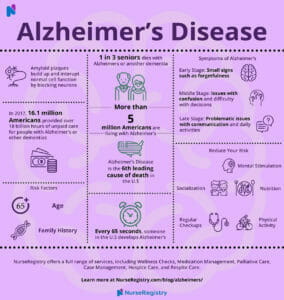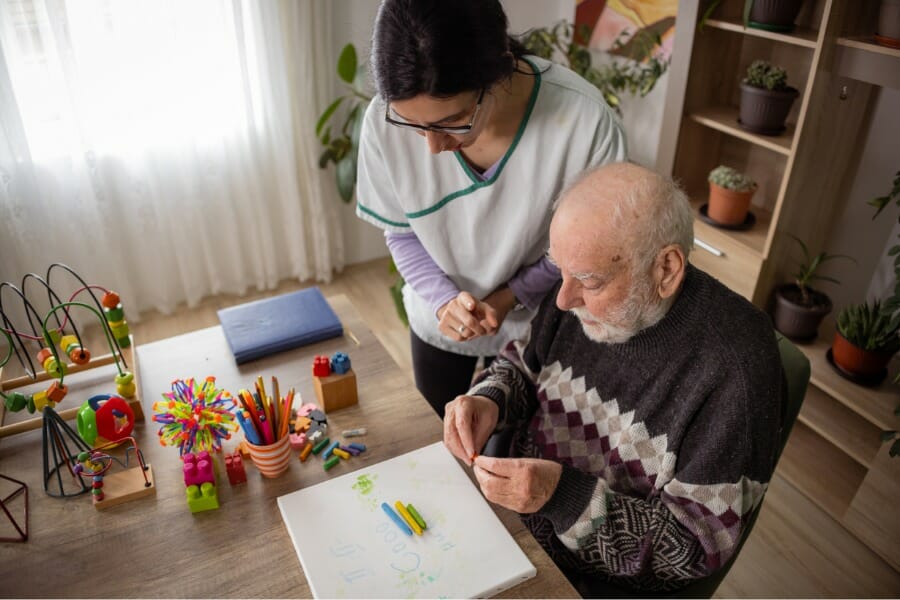Alzheimer’s disease (AD) is a progressive and irreversible brain disorder that slowly destroys memory and thinking skills. It is the most common cause of dementia, a group of brain disorders that affect a person’s ability to function independently.
Alzheimer’s disease is characterized by the accumulation of abnormal protein deposits in the brain that interfere with the communication between nerve cells and cause their death over time.
The disease usually begins with mild memory loss and difficulty in performing routine tasks, such as cooking or paying bills. As it progresses, it can lead to significant impairment in language, spatial orientation, and judgment, and eventually, to complete dependence on others for daily activities.
Alzheimer’s disease is a chronic condition that affects millions of people worldwide, with the majority of cases occurring in people over the age of 65.
Despite decades of research, there is no known cure for Alzheimer’s disease. However, there are treatments that can help manage the symptoms and slow down the progression of the disease. Early diagnosis and treatment are crucial in managing the symptoms and improving the quality of life of people with Alzheimer’s disease.
 Click here to enlarge infographic.
Click here to enlarge infographic.
Alzheimer’s disease may affect the daily activities and tasks that someone engages in. There are a few factors to consider when looking at the causes of Alzheimer’s.
The greatest influence is age, especially among people who are age sixty and above. Other factors of this disease include genetics, the environment, and lifestyle choices. In many cases, a combination of the three factors play a role in the development of the disease.
However, every individual is unique and these factors may increase or decrease the risk of contracting the illness quite differently for each person.
This article will cover the following topics on Alzheimer’s Disease.
Causes of Alzheimer’s Disease
Risk Factors
Alzheimer’s Disease Stages
Symptoms of Alzheimer’s Disease
Alzheimer’s Disease Prevention
Diagnosis and Treatment of Alzheimer’s Disease
Resources
What is Alzheimer’s Disease?
IN THIS ARTICLE
An individual with Alzheimer’s has extraordinary levels of beta-amyloid in the brain. It is known to be an extremely toxic protein that occurs naturally. High amounts of this protein build upon one another forming plaques which interrupt normal cell function by blocking neurons.
Understanding Alzheimer’s Disease
Alzheimer’s disease is a progressive brain disorder that affects memory, thinking, and behavior. It is the most common cause of dementia, a group of brain disorders that cause a decline in cognitive function.
The disease is named after Alois Alzheimer, a German psychiatrist who first described the condition in 1906. Alzheimer’s disease is characterized by the accumulation of two abnormal proteins in the brain: beta-amyloid plaques and tau tangles.
These proteins interfere with communication between brain cells and cause them to die, leading to brain shrinkage.
The exact cause of Alzheimer’s disease is not yet fully understood, but it is believed to be a combination of genetic, environmental, and lifestyle factors.
Age is the biggest risk factor for the disease, with most people developing symptoms after the age of 65. However, early-onset Alzheimer’s can occur in people as young as their 30s or 40s.
Symptoms of Alzheimer’s disease include memory loss, difficulty with language, disorientation, mood swings, and behavioral changes. These symptoms worsen over time and eventually interfere with daily life. There is currently no cure for Alzheimer’s disease, but there are treatments available that can help manage symptoms and improve quality of life.
It is important to note that not all memory loss is a sign of Alzheimer’s disease. Mild forgetfulness is a normal part of aging, and there are other conditions that can cause memory problems – such as vascular dementia.
If you or a loved one are experiencing memory loss or other cognitive changes, it is important to see a doctor for an evaluation. Early diagnosis and treatment can help improve outcomes for people with Alzheimer’s disease.
Risk Factors and Causes of Alzheimer’s Disease
Alzheimer’s disease is a complex condition that is caused by a combination of genetic, environmental, and lifestyle factors.
Age
Age is the most significant risk factor for Alzheimer’s disease. The risk of developing Alzheimer’s disease increases as people get older.
According to the National Institute on Aging, the risk of developing Alzheimer’s disease doubles every five years after the age of 65.
Genetics
Genetics also plays a role in the development of Alzheimer’s disease. Researchers have identified several genes that are associated with an increased risk of developing Alzheimer’s disease.
The most well-known of these genes is the apolipoprotein E (APOE) gene. People who inherit one or two copies of the APOE4 gene are at a higher risk of developing Alzheimer’s disease.
Lifestyle Factors
Certain lifestyle factors can also increase the risk of developing Alzheimer’s disease. These factors include:
- Lack of physical exercise
- Poor diet
- Smoking
- Chronic stress
Environmental Factors
Environmental factors can also contribute to the development of Alzheimer’s disease.
Exposure to certain toxins, such as lead and pesticides, has been linked to an increased risk of developing Alzheimer’s disease. Head injuries and traumatic brain injuries have also been linked to an increased risk of developing Alzheimer’s disease.
Symptoms of Alzheimer’s Disease
Alzheimer’s disease usually occurs in three different stages, and these stages may be different for each unique individual. Alzheimer’s Symptoms may worsen overtime. Yet, some symptoms, such as problems with the brain, begin to form long before the person even knows that they have the disease.
Let’s take a look at some of the stages of Alzheimer’s Disease.
Stages of Alzheimer’s Disease

Early Stage Symptoms
An individual in the early stage may notice small signs such as forgetting names, words, or locations of items. Often, they may not notice any symptoms in the beginning.
Early symptoms include:
- Memory Loss. Issues with remembering names and words may become a problem.
- Difficulty completing tasks. Issues may arise with completing daily or work-related tasks.
- Forgetfulness. A person may begin to forget things they have just read or learned about.
- Lack of organization. Individuals may develop problems with keeping track of events and items.
Middle Stage Symptoms
During this stage, the individual and other people will begin to notice some of the issues related to Alzheimer’s.
Middle stage symptoms include:
- Confusion. This could include confusion about the date, time, and where that person is at a particular time.
- Forgetfulness. An individual may forget parts of their past, upcoming events, phone numbers, or events that they have participated in the past.
- Mood swings. A person may get upset in social settings or when presented with a mental challenge.
- Difficulty with decisions. Choosing what to eat or wear on a particular day or time may become an issue.
Changes in sleep. Mood and sleep patterns may begin to change very easily.
Late Stage Symptoms
In this stage, people with Alzheimer’s will become very problematic. Communication will become difficult with others. They will also experience problems with their movement. Memory issues will get worse, as well as the ability to do daily tasks.
Late-stage symptoms include:
- Loss of abilities. Regular abilities such as running, sitting, and walking will become more difficult.
- Vulnerability. People may become susceptible to various illnesses and other diseases.
- Forgetfulness. An individual will begin to forget experiences that have recently occured, their surroundings, and memories.
- Communication. It will become much more difficult to communicate with other individuals compared to the previous stages.
- Difficulty with activities of daily living (ADLs). The individual will need help with certain daily tasks, including personal care and hygiene.
Now that you better understand the Alzheimer’s Disease stages, let’s discuss prevention methods.
Alzheimer’s Disease Prevention
Although there is not a cure for Alzheimer’s, there are a few strategies to delay the onset or slow the progression of symptoms. The most important step an individual can do to try and prevent Alzheimer’s Disease is to be and act healthy. As they age, this will become especially important.
The top five areas of health you should focus on are:
- Nutrition – It is important for an individual to eata healthy diet. Diets that are filled with fruits and vegetables are necessary to fuel the body with nutrients. Other foods to incorporate into a healthy diet include whole grain, fish and olive oil. Mediterranean diets are among the best for their brain health benefits.
- Physical activity – It is great for a person to be physically fit. Promote proper health and wellness by engaging in activities such as running and other workouts that strengthen the body.
- Mental stimulation – Individuals need to keep their brain active as well. This can be done through mentally stimulating occupations, cognitive games, higher education, or engaging activities. Chess, book clubs, and other activities exercise the mind.
- Engagement in social activities – This includes going out to do activities like shopping or camping with friends and family. Social activities are not limited and may include concerts, museums, grabbing coffee with a friend, and more.
- Stay healthy – Individuals should monitor their blood pressure and cholesterol level to decrease the risk of illnesses such as diabetes because these can lead to more health issues. People may also stay healthy by avoiding excessive smoking and drinking.
- Get extra help – If you need an in-home nurse, it could certainly be beneficial and provide peace of mind.
Diagnosis and Treatment

A medical professional can usually determine if someone has Alzheimer’s, but it can be a lengthy process. A proper diagnosis of Alzheimer’s disease is strenuous because there is no single test that confirms an individual has the disease.
These are the steps that can be taken to determine if a person has Alzheimer’s.
- Neurological and physical exam. This tests an individual’s motor responses—such as their reflexes—and may show if the nervous system has any issues.
- Brain imaging and blood tests. Any problems within the brain may be seen much more clearly through imaging. Blood tests can identify if an individual has a particular Alzheimer’s mutated gene.
- Mood and mental status testing. This will test an individual’s behavior, cognitive abilities, appearance, degree of consciousness, mood, perception, and attitudes.
- Medical history. Taking a closer look at an individual’s medical history may determine if a person’s health is getting better or worse. Illnesses or injuries in the past can help determine if someone might have Alzheimer’s Disease.
There is no one treatment to cure Alzheimer’s Disease, yet much can be done to help with cognitive and behavioral issues.
- Medication. There is no one medication that will cure Alzheimer’s, however, certain medications may relieve some of the symptoms, such as memory loss..
- The drug class central acetylcholinesterase(AChEi) inhibitors prevent the AChEi enzyme from breaking down acetylcholine. Acetylcholine is essential to learning and memory function; in people with Alzheimer’s, acetylcholine is broken down. This will lead to an increase of acetylcholine. Useful drugs in this class are Donepezil, Galantamine, and Rivastigmine.
- Treatment. Individuals with Alzheimer’s often take other medications, which may cause increased behavioral issues. Speaking with your doctor and asking questions is important and may prevent some issues. For example, unaddressed hearing problems may lead to more confusion for individuals with Alzheimer’s. A person with Alzheimer’s is more likely to contract other illnesses, and they may struggle with communicating issues or symptoms to their doctor.
- Clinical Trials. Individuals may participate in various clinical trials relating to Alzheimer’s that may help with understanding the relationship between symptoms and the effects of prevention tactics on cognition.
- CAM. Complementary and alternative medicine are health and wellness treatments that may help with various illnesses such as Alzheimer’s. Typically, these are used alongside conventional medicine or as an alternative treatment. Herbal remedies and dietary supplements are known by some to prevent symptoms of Alzheimer’s and slow the process down.
- Medical foods such as coconut oil and caprylic acid are known to cause brain growth by providing an alternative energy source for cells in the brain that cannot use sugar anymore due to Alzheimer’s.
- There are many other alternative therapies, yet it may be best to use them with conventional medicine. It is always best to consult your primary care physician.
How NurseRegistry Can Help

If you know someone with Alzheimer’s or dementia, NurseRegistry can help. Our skilled nurses often provide greater peace of mind than unskilled care can. We offer a full range of services, including:
Caring for a loved one can be very challenging at times. Individuals with Alzheimer’s disease can require a lot of attention and care. NurseRegistry can provide temporary care for your loved so that you can have the break you deserve, whether that be for a few hours or a weekend away.
Each one of our nurses is licensed and experienced in a variety of specialties. You can depend on our nurses to provide excellent care to your loved ones.
Call (650) 462-1001 to speak with a Client Care Coordinator about care options for your loved one. Or, click below today.
Frequently Asked Questions
What are the early signs of Alzheimer’s disease?
Alzheimer’s disease is a progressive disorder that affects the brain and can lead to memory loss, cognitive decline, and behavioral changes. Early signs of Alzheimer’s disease can include forgetfulness, difficulty with problem-solving or planning, confusion with time or place, and changes in mood or personality.
As the disease progresses, symptoms can worsen, and individuals may experience difficulty with communication, mobility, and self-care.
How is Alzheimer’s disease diagnosed?
Diagnosis of Alzheimer’s disease typically involves a comprehensive medical evaluation, including a physical exam, cognitive tests, and imaging studies. Doctors may also perform blood tests to rule out other conditions that can cause dementia-like symptoms.
A diagnosis of Alzheimer’s disease is a type of dementia based on a combination of symptoms, medical history, and test results. Early diagnosis is important to begin treatment and plan for future care.
What are the different types of Alzheimer’s disease?
There are several different types of Alzheimer’s disease, including early-onset Alzheimer’s, which affects individuals under the age of 65, and late-onset Alzheimer’s, which is the most common form of the disease and affects individuals over the age of 65.
Other types of Alzheimer’s disease include familial Alzheimer’s disease, which is caused by genetic mutations, and sporadic Alzheimer’s disease, which has no known cause.
What are the risk factors for developing Alzheimer’s disease?
The exact cause of Alzheimer’s disease is not fully understood, but researchers have identified several risk factors that can increase the likelihood of developing the disease. These risk factors include age, family history of Alzheimer’s disease, genetics, head injuries, and lifestyle factors such as poor diet, lack of exercise, and smoking.
What treatments are available for Alzheimer’s disease?
As a form of dementia, there is no cure for Alzheimer’s disease. However, there are treatments available that can help manage symptoms and improve quality of life.
Medications such as cholinesterase inhibitors and memantine can help improve cognitive function and manage behavioral symptoms.
Lifestyle changes such as regular exercise, a healthy diet, and social engagement can also help improve symptoms and slow the progression of the disease.
What lifestyle changes can help prevent Alzheimer’s disease?
While there is no guaranteed way to prevent Alzheimer’s disease, there are several lifestyle changes that can help reduce the risk of developing the disease. These include maintaining a healthy diet, engaging in regular physical exercise, staying mentally and socially active, managing stress, and avoiding smoking and excessive alcohol consumption.
Resources
The Alzheimer’s Association has educational information and resources.
The U.S Department of Health and Human Services has educational resources such as the National Institute on Aging.
The U.S National Library of Medicine has information on genetic conditions and mutations.
Mayoclinic.org offers educational resources and more information on Alzheimer’s Disease.
The National Center for Biotechnology Information has many educational resources and is an excellent resource for human behavior and the mind.
For more information on Alzheimer’s prevention and clinical trials visit nia.nih.gov.
Disclaimer: The information provided in this article is not intended to diagnose health problems or take the place of professional medical advice or care you receive from a healthcare provider. An Alzheimer’s diagnosis must be confirmed with a licensed medical professional. Always consult your healthcare provider about symptoms, health problems, medications, and treatments.






